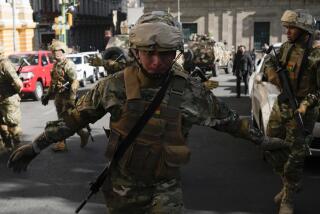Peru Stresses It Wants Peaceful End to Standoff
- Share via
LIMA, Peru — Trying to assuage fears of a police attack on the diplomatic compound where leftist rebels are holding 72 hostages, government officials said Saturday that they want a peaceful solution to the 40-day crisis.
And early today, rebels released Gen. Jorge Rivas Rodriguez of the Peruvian police, who was carried out on a stretcher shortly before 1 a.m., Lima time. According to Michel Minnig, chief delegate of the International Committee of the Red Cross, Rivas was freed at the request of the Red Cross and Bishop Juan Luis Cipriani, the unofficial government negotiator, after it was determined he was in ill health.
The war of nerves between police and the barricaded guerrillas has escalated in recent days. Late Friday night, teams of black-uniformed commandos equipped with night-vision goggles ran up to the front gate of the compound and aimed rifles equipped with silencers and laser scopes at the barricaded mansion of the Japanese ambassador.
The maneuvers came after days of ominous-looking deployments around the residence by police helicopters, armored personnel carriers and commandos.
In a defiant response Saturday, the rebels of the Tupac Amaru Revolutionary Movement sang militant songs and chanted slogans over a megaphone, declaring, “Our objective is liberty or death.” Late Saturday afternoon, the guerrillas fired two shots into the air, the latest warning shots intended to keep police at a distance.
As squads of police commandos continued their foot patrols along the walls of the compound Saturday, President Alberto Fujimori defended the deployments. He called them a legitimate effort to tighten security and not a provocation, as some observers have alleged.
“The police have the obligation to conduct the patrols,” Fujimori said. He added that the police were not interfering with workers for the Red Cross, which temporarily suspended food deliveries to the mansion for five hours Friday after an armored police vehicle entered an area the Red Cross had marked as neutral turf.
Fujimori’s statements were part of a concerted effort by the government Saturday to project a hopeful and moderate tone.
Prime Minister Alberto Pandolfi said that police were securing the area in anticipation of eventual talks between the government and the rebels. And Education Minister Domingo Palermo, Fujimori’s designated negotiator in the crisis, told reporters that preparations for talks are underway.
Despite the officials’ reference to talks, there was no sign that the government and the rebels were ready to negotiate. More than a week has passed since both sides agreed to use a neutral site near the mansion for talks brokered by a mediating commission made up of representatives of the Red Cross, the Roman Catholic Church and the Canadian ambassador.
But the two sides have been unable to break an impasse over the rebels’ demand that hundreds of convicted terrorists from their movement be released from prison. The guerrillas insist on discussing that point; Fujimori refuses to hold talks if the proposal is on the table.
In lieu of face-to-face talks, the guerrillas and the government have communicated in the symbolic language that has dominated the standoff since the Tupac Amaru took over the residence Dec. 17. As the police very visibly tighten the noose around the mansion, the guerrillas respond with rhetoric.
The aggressive posturing combined with the lack of dialogue worries many observers. Fujimori and the security forces have shown a tendency to resolve crises with force, said Susana Villaran, director of a national coalition of human rights groups.
“He is not a negotiator,” Villaran said. “He likes scenarios of conflict, and he usually chooses the tough solution.”
The standoff alarms the hostages, Villaran said. Jesuit priest Juan Julio Wicht, who declined to be released so he could offer spiritual counsel to the other hostages, recently sent a letter from the mansion to colleagues in which he said he was “extremely worried,” according to Villaran.
The government could break the impasse by agreeing to discuss the demand for the release of Tupac Amaru inmates, Villaran said: “In the framework of a negotiation, you discuss everything. That’s very different from what you agree to afterward.”
But the government has asserted repeatedly that it will not consider releasing jailed terrorists.
More to Read
Sign up for Essential California
The most important California stories and recommendations in your inbox every morning.
You may occasionally receive promotional content from the Los Angeles Times.










